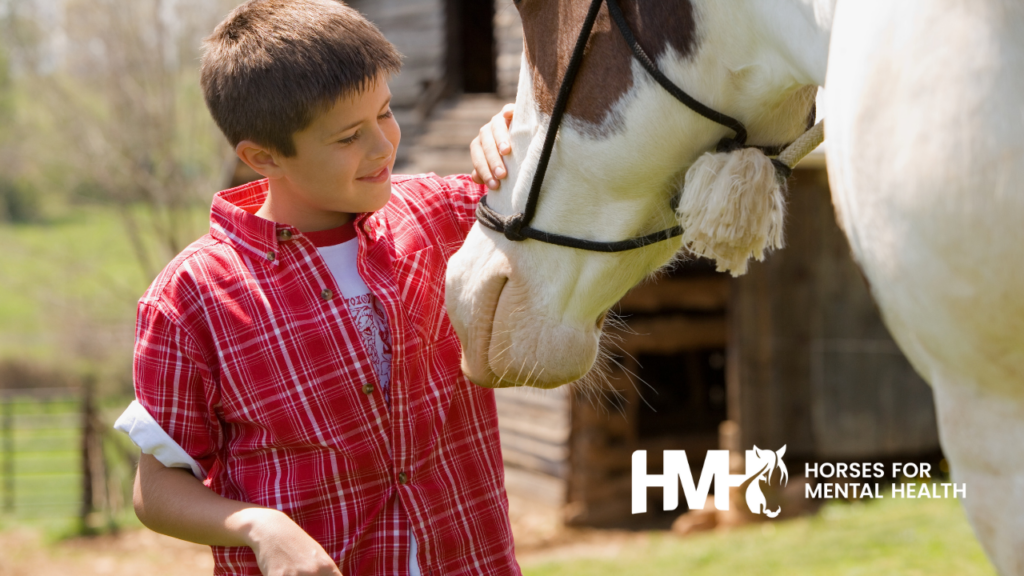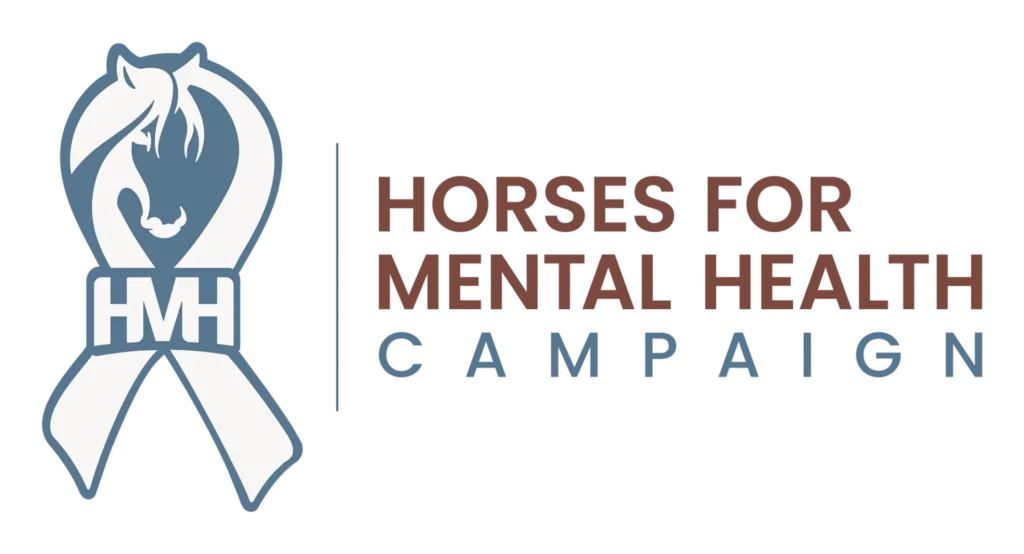1 in 6 U.S. children aged 6-17 experiencing a mental health disorder each year. That’s millions of children navigating anxiety, depression, and other challenges of growing up. (NAMI, CDC) This highlights the critical need for more resources and support.
As we kick off Mental Illness Awareness Week, Horses for Mental Health recognizes the progress being made in understanding mental illness, while sharing optimal terminology to approach open conversations and exploring treatment options.
Mental illness affects millions of people young and mature, worldwide, yet discussions around it often fall short. That’s why this week, Horses for Mental Health is proud to amplify the importance of understanding mental illness.
Stories Of Transformation
As we discuss the importance of understanding mental illness it is critical to acknowledge how mental illness manifests among different populations and ages. Psychotherapy involving horses can provide children with a safe space to explore their emotions and experiences.
A 12-year-old boy, Mark, arrived for his mental health session feeling especially anxious and overwhelmed. He had spent hours frantically searching for a school form he needed to request his classes for the next year. His mother mentioned he’d gone through his backpack and searched every corner of the house, worried that if he didn’t turn it in on time, he’d lose the chance to choose the classes he wanted. His anxiety was so high that his mother couldn’t understand why the form mattered so much to him.
Continuing from previous sessions, we invited Mark to choose a horse to work with. He chose Ozzie, who was in a barn stall. Mark grabbed a halter, intending to lead Ozzie to the pasture. But as soon as he opened the stall door, Ozzie walked out into the barn aisle, pacing back and forth, calling out to the other horses outside. Mark kept trying to put the halter on Ozzie so he could take her to her friends, but after a moment, he said, “I just don’t know what to do—she seems really stressed.”
We asked Mark what he thought Ozzie needed at that moment and why she was feeling so stressed. Out of the blue, he asked, “Has Ozzie ever been bullied?”
It was then that Mark opened up, revealing that he knew what it felt like to be bullied. His anxiety over choosing classes stemmed from a desire to avoid classmates who had been bullying him. As he shared his story, Ozzie’s energy also began to calm. Mark put down the halter and simply focused on being with Ozzie, reassuring her that she was okay. Together, they started to take deeper breaths.
As both Mark and Ozzie found calm and safety, he was finally able to put the halter on Ozzie and lead her to her friends in the pasture.
In the end, the issue wasn’t about the missing form—it was about uncovering the deeper worries he hadn’t been able to express. He began to understand that it was okay to feel anxious, and that, like Ozzie, he didn’t have to face his fears alone.
Stories like Mark’s highlight the transformative power of innovative mental health treatments. For many children and adults, the journey to understanding their mental health needs starts with these safe, supportive spaces.
Understanding Mental Illness Terminology
Mental health is a complex and often misunderstood topic. One of the biggest barriers to open and honest conversations about mental illness is a lack of understanding of the terminology used to describe it. By familiarizing ourselves with key terms, we can break down stigma, foster empathy, and create a more supportive environment for those experiencing mental health challenges.
- Mental Health vs. Mental Illness: “Mental health” refers to our emotional and social well-being, while “mental illness” describes diagnosed conditions that disrupt these aspects. This distinction helps clarify conversations about mental health which does not always include a discussion about mental illness.
- Person-First Language: This emphasizes the individual before their condition, so instead of saying “a schizophrenic,” say “a person with schizophrenia.”
- A person with Lived Experience: This term acknowledges the individual’s journey and resilience, recognizing their insights without solely defining them by their condition. For example, instead of “struggling with mental illness”, say “living/experiencing mental illness.”
- Treatment Journey: Referring to managing mental health as a “treatment journey” highlights that it’s an ongoing process focused on growth rather than “battling” mental illness.
- Psychiatrist vs. Psychologist:
Psychiatrists, as medical doctors, can prescribe medication and may oversee psychotherapy involving horses as part of a comprehensive treatment plan. Psychologists focus on providing therapy and may lead psychotherapy sessions involving horses, integrating psychological principles into their work with clients. Both professionals can play valuable roles in psychotherapy involving horses, depending on their training and expertise.
The language surrounding mental health is ever-changing; as society’s understanding evolves, so does the terminology we use. For more insights on mental health terminology, you can refer to these glossaries:
- NAMI Glossary: NAMI Glossary
- Mental Health America’s Glossary: Mental Health America Glossary.
Navigating the Path to Diagnosis and Seeking Treatment
Getting a diagnosis for mental illness is an important step to understanding your personal mental health needs. Here’s a quick overview of the process:
- Recognize Symptoms: Identify symptoms like persistent sadness or anxiety. Keeping track can help you and your loved ones seek the right treatment.
- Consult a Professional: Schedule an appointment with a mental health provider who specializes in diagnosing mental illnesses.
- Assessment Tools: Professionals may use structured interviews and questionnaires to evaluate your condition.
- Understanding the Diagnosis: After evaluation, the provider will explain the diagnosis and recommend a tailored treatment plan.
- Choose a Treatment Plan: Work with your provider to find a treatment plan that suits you, including traditional therapies, medication, or innovative approaches like therapy involving horses.
Navigating treatment for mental illness can be challenging, but knowing your options is crucial. Here are just some of the treatment options available to people who have received a mental illness diagnosis:
- Therapy:
- Cognitive Behavioral Therapy (CBT): This evidence-based therapy helps individuals identify and change negative thought patterns and behaviors. It’s effective for anxiety, depression, and other mental health issues.
- Dialectical Behavior Therapy (DBT): Particularly useful for managing emotional regulation, DBT combines cognitive-behavioral techniques with mindfulness practices, helping individuals cope with distressing emotions and improve relationships.
- Support Groups: These groups provide a safe space to share experiences and receive support from others.
- Holistic Therapies: Practices like yoga, meditation, and acupuncture can enhance overall well-being.
- Psychotherapy Involving Horses: This unique treatment uses interactions with horses led by trained mental health professionals to build trust and help manage anxiety, trauma, and many other mental illnesses.
Creating a treatment plan with your healthcare provider helps tailor these options to your needs. Seeking treatment for a mental illness is a brave step toward better mental health, and finding the right combination of treatments can significantly improve overall health outcomes and happiness.
As we move through Mental Illness Awareness Week, let’s continue to raise awareness and support one another. Remember, seeking help is not a sign of weakness but a courageous step toward healing. YOU can create a community that prioritizes mental well-being and ensures that everyone has access to the support they deserve.










